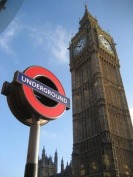It took several days and a lot of energy and concentration to read 2 introductions and then Huxley's introduction before I even got to Brave New World. These definitely serve the purpose of bounders - you make sure that the people who get to the novel "the good bits" really wanted to be there! But apart from that, the introductions did little for me (although I was interested to read that when zippers were first invented, priests preached against them as evil because it meant you could get your clothes off so much more quickly!)... sorry getting distracted already - this is book club, not introduction club.
I didn't expect to like this book - I'm not a huge fan of sci-fi and I remember watching "1984" and being pretty traumatised by it.
But I did. I love it. I love reading "classics" and discovering that they truly fulfil the promise such a title holds.
For me what I loved the most was Huxley's writing. I found it to be a perfect ix of interesting language which was readable at the same time - the worlds made me read faster and understand more, rather than causing me to stumble on difficult phrasing, awkward sentences or unnecessarily pretentious words, as can sometimes be the way when someone tries to write a classic. The collections of words he used conjured up clear pictures, moods and atmospheres so that I became totally absorbed by the book and could imagine so clearly what The World State was like. It was a pleasure to read this book, even when the ideas were challenging and uncomfortable. To me, this is how reading should be.
The success of his words supports his very well thought-out world view. Most area of life are addressed in the book - not in an obvious "this is how the world is" way, but through descriptions woven through the story. One review I read of the book described his world view as "convincing" - I think this is a very good word for it. Interestingly (according to one of the introductions!) the main area of life he does not provide much detail on is food. I also was intrigued to know what the streets were life - were they clean? I'm guessing so. And what their houses were like. If they didn't have families then I guess everyone has to have their own house? Especially as houses are such sources of consumption.
Interestingly, Brave New World was inspired by the H. G. Wells' utopian novel Men Like Gods. Wells' optimistic vision of the future gave Huxley the idea to begin writing a parody of the novel, which became Brave New World. Contrary to the most popular optimist utopian novels of the time, Huxley sought to provide a frightening vision of the future. A big question for me is "is the world Huxley paints such a bad world?" - frightening yes, but then what are the alternatives? So many pros and cons, but a contentious one to throw out there.
Brave New World received nearly universal criticism from contemporary critics, although his work was later embraced. The American Library Association ranks Brave New World as #52 on their list of most challenged books. A number of countries have banned this book and schools have taken it off reading lists.
...So a lot of people for a long time have been disturbed by what they are reading in Brave New World - for me I was more fascinated by his predictions and how accurate some predictions of over 80 years ago have been. But I think the ruckus this book has caused is a sure sign of the success of the book - it gets under people's skin, it frightens people, it causes people to question the world and how they are living.
There is so much I loved about this book, and a few questions I had and a few bits that grated with me... did John the Savage really need to be Thomas' son? Lenina and Johns' never-quite-there love/relationship... did that annoy anyone else? Huxley seemed convinced that synthetic smells would play a large part in the future - the perfumes on tap, the scent organs... and takes on that?
But mostly I loved it and could talk and write about it for hours. There's so much to discuss - so much that makes us question how we are living now. When Huxley wrote Brave New World he said that the world he had written about was coming true much quicker than he thought it would.
Thank you Lou for choosing such a great, pneumatic book!
DISCUSS THE BOOK AND CLARE'S COMMENTS IN THE FORUM
3 Comments
|

 RSS Feed
RSS Feed